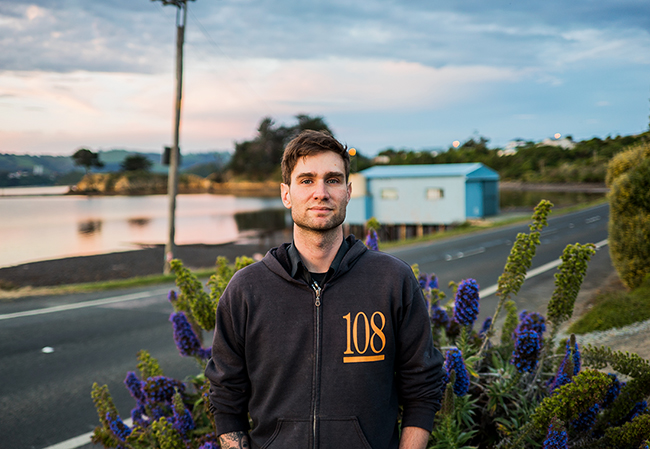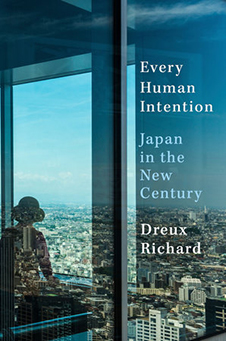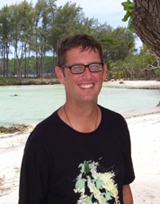Tuesday 2 March 2021 11:31am

The Wall St Journal has described Social Anthropology and Economics PhD candidate Dreux Richard’s new book Every Human Intention: Japan in the new century as an "eclectic collage" that weaves together stories of decline, reform and survival in a post-Fukushima Japan already hobbled by economic stagnation and an aging society.
Dreux explains the motivations behind the book, his studies, and how he appreciates academic supervision at Otago which treats his thesis as “an opportunity to make a distinct and lasting intellectual statement.”
What is the book about?
It’s a literary non-fiction book about contemporary Japan, in three parts. The book ‘follows’ a format similar to University of Chicago Professor Norma Field’s 1991 work In the Realm of a Dying Emperor. I was trying to repeat her achievement: a literary account developed from original field research, written in a way that experts would take seriously, but a general readership would also enjoy.

The first part follow members of Japan’s Nigerian community, whose struggles with a hostile immigration system lead to the death of a Nigerian immigrant in a Japanese detention center. The death hadn’t been fully investigated until members of the community asked me to look into it last year.
The second part covers Japan’s record-breaking population decline through my experiences in the nation’s northernmost city. I went door to door with the city’s youngest census employee, for instance. And the city was the first in Japan to build a nursing home inside its downtown transit hub, so I documented the stories of the home’s staff and residents.
The final part is based on several years I spent embedded with energy executives and nuclear regulators, as they fought to determine whether reactors threatened by earthquake faults would be permitted to restart after the Fukushima disaster, a conflict that brought the entire regulatory system to the brink of collapse.
Altogether this amounted to a six-year project. For the duration, I worked hard to remember that I was an outsider to the communities I was writing about, working more as an interpreter—between these communities and my readers—than as an expert of any kind.
What are the advantages (or otherwise) of using what the Journal describes as an “eclectic collage of stories about Japan in the decade since the earthquake”?
That has been a common theme of reviews so far: That the communities I chose to document are “eclectic” or “niche.” Although many of those comments have been positive, they don’t reflect my own feelings about the stories I told. I wrote about issues that define the trajectory of Japanese society. I chose to do it by closely observing three groups of people, using what anthropologists would call a ‘descriptive ethic.’ Or, in literary terms: By building metaphors, rather than presenting hypotheses.
That may be what reviewers are responding to – that I am relying on readers to make connections between the events I observed and their significance to Japan’s national drama, rather than making explicit arguments about why the events are important.
Why did you want to discuss the “three complex dilemmas . . . decline, diaspora (or immigration) and reform”?
It was never intentional. I was living and writing in Japan starting in late 2010, when it was already clear that Japan would need an influx of immigrants to replace a declining population, and it shortly became clear that post-Fukushima reforms to the nuclear industry would test Japanese society’s capacity to better itself by democratic means. You couldn’t be an engaged person (let alone journalist) and not find yourself in a dialogue with these issues.
What is your PhD about, who are your supervisors, and did you why choose Otago?
My thesis explores processes of nation-building, secessionism, and economic self-governance in the former Biafra region of Nigeria, specifically Abia State. Ethnographically speaking, my field research was conducted with two groups of people: Smugglers (of contraband) based in the state’s largest city (Aba) whose profession is rooted in kinship networks belonging to the town of Abiriba, and politicans involved in patronage schemes connected to the Aba region’s indigenous sub-ethnic group, the Ngwa.

Dr Greg Rawlings
My supervisors are Greg Rawlings (Social Anthropology) and Nathan Berg (Economics). The late Cyril Schäfer was my supervisor before he passed away.
Otago offered me a scholarship to pursue my doctorate under a higher-degree-by-research scheme. Greg and Cyril worked hard to convince me that my long relationship with the communities where I conduct research would be recognized institutionally at Otago, allowing me to write an exceptionally daring thesis. It’s difficult to overstate how important this all was, and how true to his word Greg has been.
In an academic environment where PhDs outnumber available jobs, nothing could be more important to me than the sense that my supervisors (and Otago) offer a doctoral format that recognizes how important the thesis should be, treating it as an opportunity to make a distinct and lasting intellectual statement.
Why did you undertake research in this area?
Social anthropology in general and the ethnographic method in particular were at the height of their cultural relevance in the time and place where I was born (1986, Washington, DC).
Inequality was extremely high during the Reagan era, the District had the nation’s worst problem of crime and homelessness, and people were looking to social scientists for answers. The seminal work in urban ethnography (Tally’s Corner) had been researched in the District, and you simply grew up understanding the value of participant observation. It wasn’t until I was much older that I realized ethnography was considered primarily an academic—rather than a broadly intellectual or literary—vocation.
I had been covering Japan’s African (mostly Igbo Nigerian) community for a newspaper for nearly six years when I came to Otago. I wanted the freedom to think systematically about Igbo problems and historical events on the basis of longitudinal research. The type of study that Greg, Cyril and I agreed on was clearly an opportunity to meet those goals—to develop a durable intellectual framework on the basis of several years of participant observation.
What is your journalistic or general background?
I have no formal background in journalism. My mother was a poor people’s lawyer when I was growing up, which meant she had to be very good at obtaining sensitive information and leveraging it on behalf of vulnerable people. My academic background is in literature and literary writing. What I’ve done for the past ten years is really a combination of the skills I learned from my mother, growing up in her office, and a desire to apply them in a literary way—to observe the world and put my observations on the record, carefully, compassionately and uncompromisingly.
What was your reaction to having your work reviewed in The Wall St Journal?
Book publishing is harder and harder to break into every year, and once you’re in, it’s harder and harder to get anyone to heed what you’ve written. Even being published by Pantheon/Knopf Doubleday—certainly up there among the world’s best publishers—doesn’t necessarily guarantee that the information you’re disseminating will be widely noticed. It’s important to me that major book review outlets have taken my work seriously, because I believe the events documented in the book are important. What the public knows about the process of restarting Japan’s nuclear reactors is mostly lies, to give one important example. And what they’ve been told about the death of a Nigerian hunger striker in a Japanese detention facility is even worse (even less true, that is). It took five and a half years for me to set the truth of these events down. The review in The Wall Street Journal makes it more likely that the people whose lives were affected by these events will see a proper accounting take place in a public manner.
Has there been much reaction to the book in Japan?
Not yet, although I imagine there will be. The book contains several journalistic revelations which update news items that were covered in the Japan’s national media (as well as the global media). And my agent has already received one concrete offer from a Japanese publisher (for translation rights).
Will you promote the book in future in the US? Where to now?
Book promotion is extremely difficult during the pandemic, especially for debut authors. All events have moved online, and the US media is still operating in a Trump-era paradigm, chasing clicks rather than foregrounding a wide variety of important stories from around the world. At present I’m working full-time to promote the book, but it’s unclear how long it makes sense to continue doing that.
Once that’s done, my supervisor and I will finalize an intended schedule for thesis submission. I’ll also start work on my next book for a trade press.
